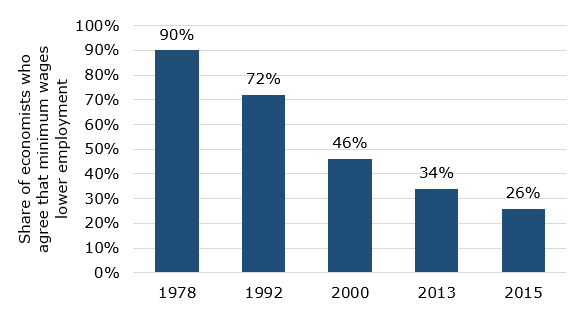Stuck in the 1980s
Throughout the summer, one of the questions I have been asked by clients from time to time was about minimum wages. It’s not been a major issue but an increase in minimum wages has from time to time been brought up as a potential trigger for higher unemployment and/or higher inflation. This is interesting to me, because as someone who makes a living keeping up with the latest economics and finance research, it is one example how out-of-date economic beliefs linger on and continue to shape policies long after they have been debunked.
From time to time, economists are surveyed about their beliefs in certain economic “truths”. Max Jerneck inspired this post by posting the share of economists who agree with the statement that minimum wages lower employment among low-wage workers.
Share of economists who believe that minimum wages lower employment
Source: @Max_Jerneck
In fact, the surveys of the Initiative on Global Markets provide a weekly reality check on a broad range of topics and show all too often how the consensus amongst experts has shifted away from beliefs held by politicians and the public.
In the 1980s, it used to be consensus amongst economists that minimum wages are bad and lead to higher unemployment. This is the basis on which conservative politicians still fight the introduction or increased of minimum wages. Yet, 30 years of additional research has shown this to be wrong. Today, the large majority of economists is in favour of minimum wages, and amongst labour economists the majority is even bigger.
Being stuck in the 1980s with their economic beliefs is by no means a prerogative of conservative politics. Politicians and advocates on the left keep on arguing that reducing the number of hours in a workweek increases employment because businesses need to hire additional workers if the workweek is cut from 40 hours to 38 hours or even 35 hours. Here is what economists think of that.
Employment in France is higher today than it would be without the introduction of a 35-hour workweek
Source: IGM
Economics, like every field of inquiry changes what is considered to be the truth as our knowledge grows. It was only 120 years ago that physicists believed that the universe was filled with ‘ether’, through which light moves. In medicine, blood-letting has been practised for 2,000 years until the end of the 19th century. There is nothing out of the ordinary in the consensus shifting extremely over time as new evidence emerges. What is wrong is to stick to beliefs in the face of overwhelming evidence to the contrary – something that even many academics and experts do.
As investors, we have to take the world as it is, not as it should be or as we want it to be. And that means that if you are able to change your mind as the evidence changes, you will have an advantage over your fellow investors.





